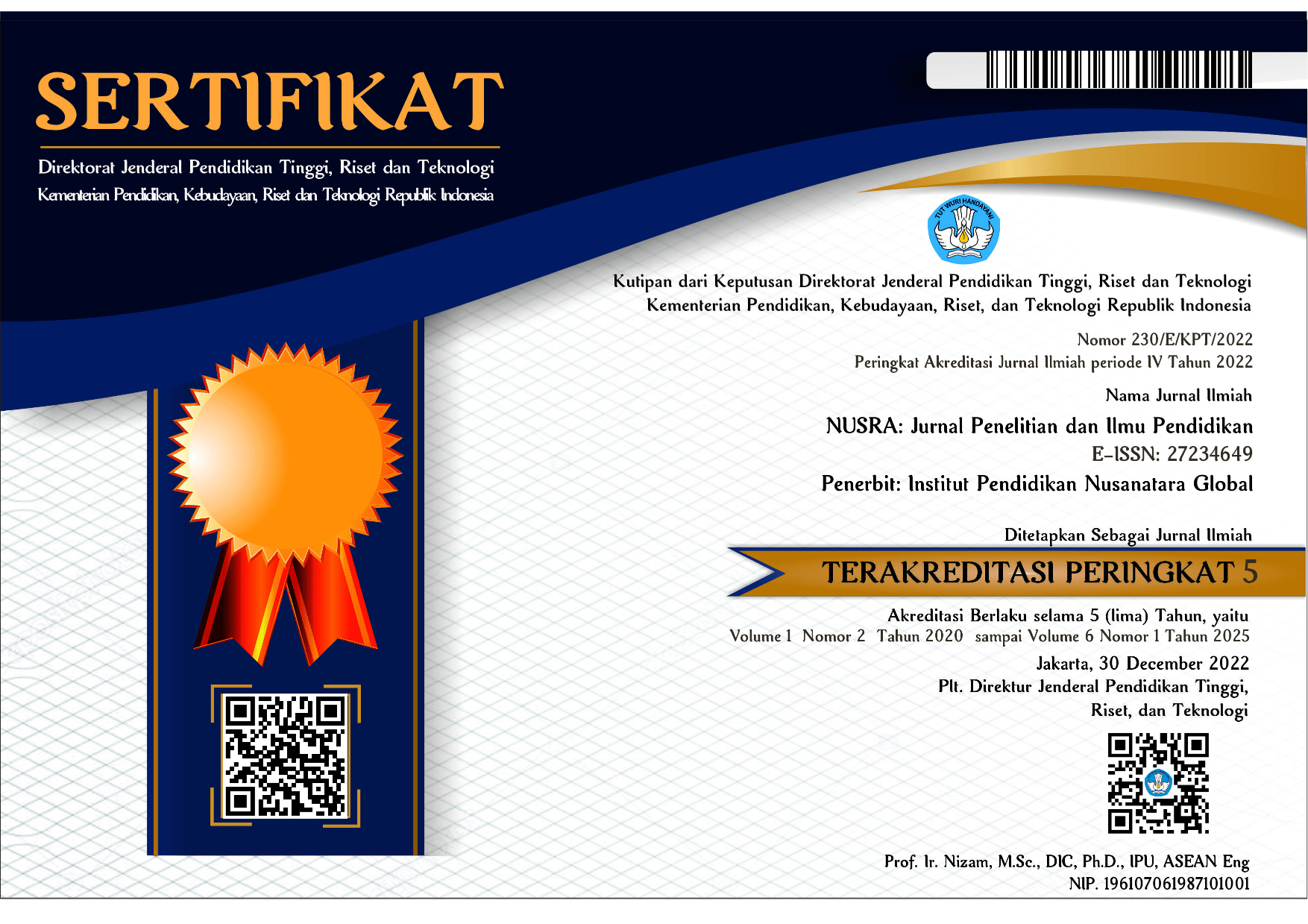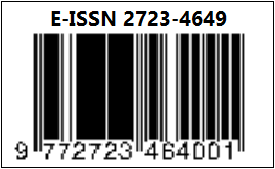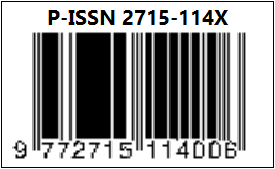PERBEDAAN PENINGKATAN KEMAMPUAN KOMUNIKASI MATEMATIK SISWA SMK MELALUI PENDEKATAN CONTEXTUAL TEACHING AND LEARNING DAN PEMBELAJARAN KONVENSIONAL
DOI:
https://doi.org/10.55681/nusra.v4i3.1338Keywords:
Mathematical Communication Skills, CTL (Contextual Teaching and Learning), Through Conventional Learning, Interaction of learning approachAbstract
This study aimed to determine: (1) The difference upgrades between the mathematical communication skills that students acquire learning through approach Contextual Teaching and learning and students receiving learning through conventional learning, (2) The interaction between learning approaches and early math skills of students (high, medium and low) to increase students' mathematical communication skills. This study is a semi-experimental study. The study population was a class X student of SMK Negeri 1 Bireuen, with two lines ANOVA analysis and t-test. The results showed that (1) There are differences in students' mathematical communication skills improvement among students who received learning approach CTL to increase students' mathematical communication skills, (2) There is no interaction between teaching approaches used and early math abilities of students to increase mathematical communication skills students. Based on the results and discussion of the research that has been described, it can be concluded that there are differences in improving students' mathematical communication skills between students who get the contextual teaching and learning/CTL learning approach and improving students' mathematical communication skills who get conventional learning.
Downloads
References
Ansari, Bansu. 2009. Komunikasi Matematika Konsep dan Aplikasi. Banda Aceh: PeNa
Arikunto, S. 2005. Dasar-Dasar Evaluasi Pendidikan. Jakarta: Bumi Aksara
Andriani, Melly. 2008. Komunikasi Matematika. Yogyakarta
Dahar, R.W. 2006. Teori-teori Belajar dan Pembelajaran. Jakarta: Erlangga
Depdiknas. (2003). Pendekatan Kontekstual (Contextual Teaching and Learning). Jakarta: Depdiknas Dirjen Dikdasmen. Makalah tidak diterbitkan
Dewey, J (1916). Democracy and Education: An Introduction to the Philosophy of Education. New York: Free Press
Hadi, S. 2005. Pendidikan Matematika Realistik dan Implementasinya. Banjarmasin: Tulip
Haji. S. 2005. Pendidikan Matematika Realistik. Banjarmasin:Tulip Banjarmasin
Hayat, Bahrul. 2005. “Keniscayaan Inovasi Pendidikan dalam Era Teknologi Informasi dan Komunikasi. “Makalah Seminar Pendidikan, 28 April 2005 di: Jakarta
Hudoyo, H. (1979). Pengembangan Kurikulum Matematika dan Pelaksanaannya di depan Kelas .Usaha Nasional: Surabaya
Ismail.Dkk. 2003. Kapita Selekta Pembelajaran Matematika. Jakarta: Universitas Terbuka
Johnson, E.B. 2002. Contextual Teaching and Learning (what it is and why it’s here to stay). California Thousand Oaks: Corwin Press, Inc
Komalasari, K (2010). Pembelajaran Kontekstual: Konsep dan Aplikasi. Bandung: Refika Aditama
Kunandar. (2007). Guru Profesional Implementasi Kurikulum Tingkat Satuan Pendidkan (KTSP) dan Sukses Dalam Sertifikasi Guru. Jakarta: PT.Raja grafindo Persada
Nurhadi. (2003). Pendekatan Kontekstual (Contextual Teaching and Learning). Jakarta: Dirjen Dikdasmen Direktorat Pendidikan Lanjutan Pertama
Nurhadi, dkk (2003). Pembelajaran Kontesktual dan Penerapannya dalam KBK. Malang: IKIP Malang
NCTM. (2000). Principles and Standards For School Mathematics. Virginia: National Council of Teacher Mathematics
Matmatika Siswa Sekolah Menengah Pertama. Tesis: UPI Bandung
Ruhdiani. (2012). “Peningkatan Kemampuan Pemahaman dan Sikap Positif Terhadap Matematika Siswa Madrasah Ibtidaiyah Melalui Pembelajaran dengan Pendekatan CTL”. Tesis. PPs UNIMED Medan. Tidak diterbitkan
Ruseffendi. E.T (1991).Pengantar Kepada Membantu Guru Mengembangkan Kompetensinya Dalam Pengajaran Matematika Untuk Meningkatkan CBSA. Bandung: Tarsito
Ridwan. 2006. Pengantar Statistika. Bandung: Alfabeta
Slavin, R.E (1994). Educational Psychology Theory and Practice. Needham Heights: Allyn and Bacon Publisher
Sudjana. 2005. Metode Statistika. Bandung:
Downloads
Published
How to Cite
Issue
Section
License
Copyright (c) 2023 NUSRA: Jurnal Penelitian dan Ilmu Pendidikan

This work is licensed under a Creative Commons Attribution-ShareAlike 4.0 International License.














